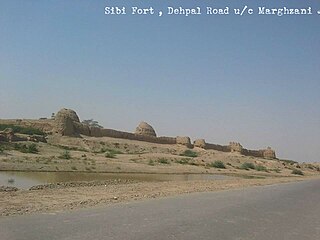
Sibi is a district in the Balochistan province of Pakistan. The main mountain ranges are Zen, Bambore and Dungan. The climatic and topography of Sibi District is quite varied compared to other districts of Balochistan. It is also known as the "Hot spot" of Pakistan where the temperatures in the summer exceed 52.6 °C (126.7 °F). Until 2013 the district had two sub-divisions, Sibi and Lehri, further organized into Tehsils and sub-tehsils: Sibi, Lehri, Kutmandi and Sangan. Lehri was rejoined with Sibi district in 2018.
Sibi is a city situated in the Balochistan province of Pakistan. The city is the headquarters of the district and tehsil of the same name.
The Bazai is a Pashtun tribe settled in Pakistan and Afghanistan. The Bazai Tribe is the sub-cast of Kakar tribe living in the western and southern region of Quetta District, Pishin, Ziarat and Sibi districts of Balochistan. The tribe is mainly settled in the mountainous regions, including the Maslagh, Zarghoon, Takatoo mountains of Quetta.

Sangan is a village in Sibi District, Balochistan, Pakistan. In 2011, the population was 2241 in 484 households.
Tumandar is a title given to the leader of Baloch & Pashtoon tribe in Pakistan.
Sibi Tehsil is a subdivision (tehsil) of Sibi District in the Balochistan province of Pakistan. The Sibi Tehsil consists of 6 circles Sangan, Sibi, Talli, Kurak, Khajjak and Mal.
Shahrigh is town and union council of Sibi District in the Balochistan province of Pakistan. It is located at 30°11'23N 67°42'34E and has an altitude of 1217 m (3996 ft).
Mastung, the capital of Mastung District, is a town in the Balochistan province of Pakistan. It is located at 29°48'0N 66°50'60E and has an altitude of 1701 metres. The town is also the administrative centre of Mastung Tehsil, an administrative subdivision of the district – the town itself is administratively subdivided into two Union Councils.
Sāfī is a major branch of the greater Ghurghakhti Pashtun tribe. The Safi tribe comprises a majority in the Pech Valley of Kunar and are present in significant numbers in Parwan Province, Kapisa Province, Kabul Province, Laghman Province, Nuristan Province, and Safi-yan in Zabul Province Close to Durand line, Lead by Haji Khudai Dad Khan Safi, Haji Qalam Khan Safi and Haji Esmatullah Khan Safi. A reasonable majority also resides in different urban and rural areas of Khyber Pakhtunkhwa, particularly Peshawar, Charsadda, Mardan, Nowshehra, Swabi. A large number also settled in Rawalpindi, Tarnol, Karachi, Lahore, Multan. They are also present in large number in Mohmand, Bajaur Agency, Federally Administered Tribal Areas and in Zhob District, Balochistan, Pakistan. district {quetta} district {loralai} district {sibi}
Luni,, pronounced "Looni", is a village in the Balochistan province of Pakistan. It is located about 11 kilometres (6.8 mi) north of the city of Sibi in Sibi District of Balochistan Province, at an altitude of 495 feet (151 m).
Panni refers to a Pashtun tribe in Afghanistan and Pakistan. Another name for the tribe is Balailzai. Like other Pashtuns, they have Eastern Iranian genetic and ethnolinguistic heritage. They claim descent from Gharghasht. Most of them are settled in parts of Pakistan or Afghanistan, such as Karachi, Quetta, Musakhail, Dera Ismail Khan, Mardan, Peshawar, Haripur, Kabul, Tank, Kohat, Sibi, while there are some communities in the United States, United Kingdom, and other Western countries. They were, at one point in time, holding main posts in the Government especially during the rule of Bahlol Lodhi. After his reign ended, they scattered and migrated to various parts of the Indian subcontinent and the Middle East. Some Pannis have also migrated to South India. However, most of them are settled in Pakistan. The Zamindars of Karatia in Bangladesh are of Panni descent.

Barozai is a clan of Balailzai, a Pashtun tribe in Afghanistan and Pakistan. Panni (Panri) are also known as Balailzai. The Panni are descended from Gharghasht, one of Qais Abdur Rashid sons. Originated from present Pakistan-Afghanistan border and then mostly resettled in Karachi, Quetta, Zhob, Sibi, Sangan, Musakhail, Harnai, Dera Ismail Khan, Ziarat, Mardan, Peshawar, Kabul, Tank, Kohat.
The Khajjak is a village at a 8 kilometers distance from Sibi city of Balochistan, Pakistan. The whole of the Khajjak town is very rich particularly in wheat. The Khajjak tribe hold the means of irrigation by the Nari completely in their hands and their crops extent of cultivation were unequaled in any part of Kachhi District.
Marghzani tribe is one of prominent tribes of Sibi and Musakhail. The tribe itself a tribe of Panni Pashtoons.The tribe as per their background must have spoken Pashto as those belonging to Musakhail do speak but those living in areas of Sibi speak Sindhi.Sibi is famous for its diversity where each ethnic group despite their background speaks Sindhi.
Talli is a village at a distance of 22 kilometers from Sibi city of Balochistan, Pakistan.
Mizri is a village near Sibi Balochistan Pakistan.

The Sibi Bhagnari or Sibi is the largest breed of Zebu cattle and originates from Sibi in Baluchistan, though also found elsewhere in Pakistan and also India. The name is derived from the town of Bhag which is found to the south of Sibi and Naari which is a river that flows through the breeding area. The areas consists of Talli, Khajjak, Kurak, Mithri and Bhag. Each year the giant cattle are shown at the Sibi Mela.

The Sibi Fort is situated in Sibi city of Balochistan Province, Pakistan. The Sibi (Siwi) was popular place of the Chachnama that the King Chach defeated Sewas, pushing them out of this place captured Sibi Fort. The Hindu rulers Sewas had kept this for some time but lost to king Chach in 550 A.D. The Brahman rule continued here till the early part of eighth century A.D. When the young Arab general [Muhammad bin Qasim] conquered the whole of these areas, In the 11th century Sibi was included in Ghaznavid Empire. The Muslims rule remained it included in the Suba Multan under Nasir ul din Kabacha




